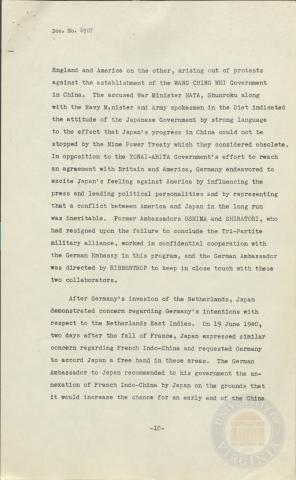
Page 10
| Parent | Doc. 6907 - Collaboration Between Japan, Germany and Italy, Volume 1 - Opening Statement |
|---|---|
| Date | |
| Language | English |
| Collection | Tavenner Papers & IMTFE Official Records |
| Box | Box 15 |
| Folder | Japan, Germany, Italy Collaboration Vol 1 |
| Repository | University of Virginia Law Library |
Doc. No. 6907
England and America on the other, arising out of protests against the establishment of the WANG CHING WEI Government in China* The accused War Minister HATA, Shunroku along with the Navy Minister and Army spokesmen in the Diet indicated the attitude of the Japanese Government by strong language to the effect that Japan1s progress in China could not be stopped by the Nine Power Treaty which they considered obsolete. In opposition to the YONAI-ARITA Governments effort to reach an agreement with Britain and America, Germany endeavored to excite Japan1s feeling against America by influencing the press and leading political personalities and by representing that a conflict between America and Japan in the long run was inevitable* Former Ambassadors OSHIMA and SHIRATORI, who had resigned upon the failure to conclude the Tri-Partite military alliance, worked in confidential cooperation with the German Embassy in this program, and the German Ambassador was directed by RIBBENTROP to keep in close touch with these two collaborators*
After Germany*s invasion of the Netherlands, Japan demonstrated concern regarding Germany1s intentions with respect to the Netherlands East Indies* On 19 June 1940, two days after the fall of France, Japan expressed similar concern regarding French Indo-China and requested Germany to accord Japan a free hand in these areas. The German Ambassador to Japan recommended to his government the an¬nexation of French Indo-China by Japan on the grounds that it would increase the chance for an early end of the China
